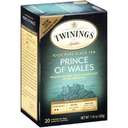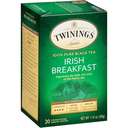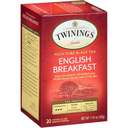Prince of Wales (Loose)
This tea has been retired/discontinued.
85
Percentile
3 ratings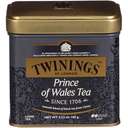 |
Commercial Description
Fine black tea expertly selected from the Hunan, Jiangxi, Anhui and Yunnan provinces in China.
RateTea Notes
Although Twinings still sells this blend in tea bag form, it seems to have discontinued the loose-leaf version.
Ratings & Reviews
Page 1 of 1 page with 3 reviews
 75 Aroma: 8/10 Flavor: 4/5 Value: 4/5
75 Aroma: 8/10 Flavor: 4/5 Value: 4/5oregongamer (4 reviews) on Jan. 10th, 2018
Less tannic and lighter than English Breakfast blends, this tea is my go-to for afternoon sipping. A quintessential Chinese offering and packed in a tin.
 60 Aroma: 4/10 Flavor: 3/5 Value: 3/5
60 Aroma: 4/10 Flavor: 3/5 Value: 3/5Karen Hong (2 reviews) on Oct. 12th, 2017
I felt at the first sip of this tea like swallowing a gulf of bonfire smoke, or, say, some embers (for its slightly-sweet finish). When I have a one-hundred-gram tin of Prince of Wales, a cuppa at afternoon tea time would bring me a shot in the arm in my dull everyday routines as if to go camping on a weekend and have a stick of seared marshmellows by fireworks. Prinince of Wales tasted light and delightful that way. This tea was too weak in taste and faint in aroma to please my cranky palate to the fullest. Nevertheless, it is a good starter for cambric tea if you are not familiar with the bitterness of black tea.
 75 Aroma: 8/10 Flavor: 4/5 Value: 4/5
75 Aroma: 8/10 Flavor: 4/5 Value: 4/5Difflugia (170 reviews) on Apr. 12th, 2017
The dry tea is quite broken and, though there is quite a bit of dust at the bottom of the tin, most of the pieces are noticeably larger than the tea in the teabags. The aroma is faint, but malty and pleasant.
Adding the water draws out a smoky, earthy aroma that is characteristic of other Chinese black teas. The initial flavor is mildly astringent and barely bitter, tasting of tannic oak leaves with some sweetness in the background. The tea is actually quite a nice blend. It's not as malty or sweet as I prefer, but I like the slight bitterness that this tea has that other Chinese blends sometimes lack. Even with the slight bitterness, though, the tea is incredibly mellow.
As the tea cools, the more complex flavors show through and distinguish this tea from similar ones. The smokiness from the initial aroma blends nicely with the sweetness as the bitterness and astringency become slightly more pronounced. A bit of maltiness comes through as well. The flavor profile is similar to other Chinese black blends and shows characteristics of both Keemun and Yunnan teas, but I haven't tasted another blend that's exactly like this one.
While I feel that some Twinings teas are overpriced, this one isn't. At $1.50 per ounce, it holds its own against medium-grade black teas from Asian grocery stores. Even if you're limited to grocery store tea brands, this is a nice change from the Assam teas in the other packages.
Do note, however, that the loose tea in the tin is much, much higher quality than the same variety in teabags. Although that's true to some degree with most other teas, it's especially pronounced with this one. The tea in the tin is quite good, but the teabags are almost flavorless.
Page 1 of 1 page with 3 reviews
More Black Tea from from Twinings
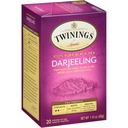
Darjeeling
| Style: | Darjeeling Black Tea |
| Region: | Darjeeling, India |
| Caffeine: | Caffeinated |
| Leaf: | Teabag |
36
10 Ratings


